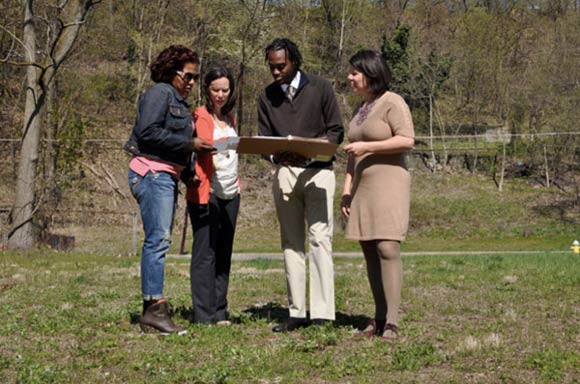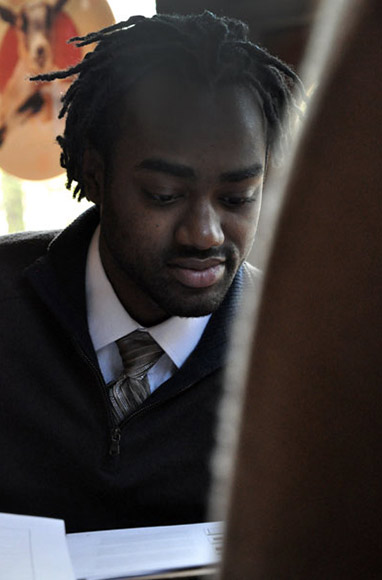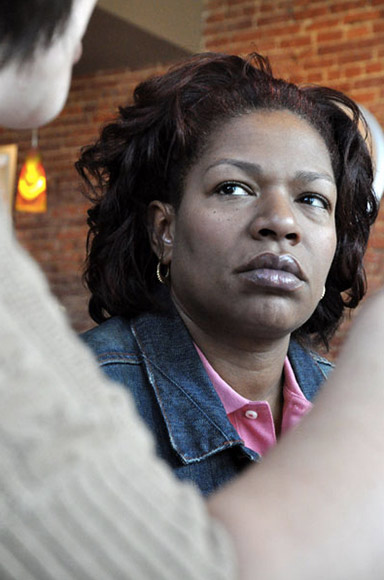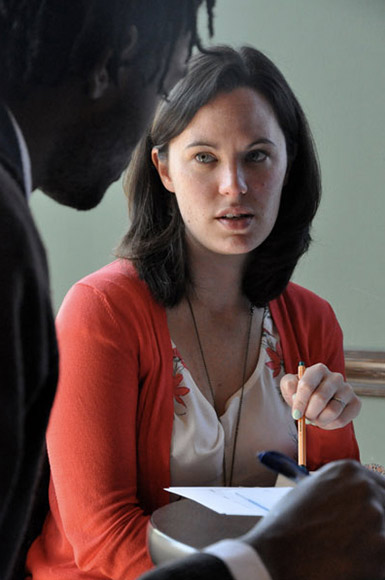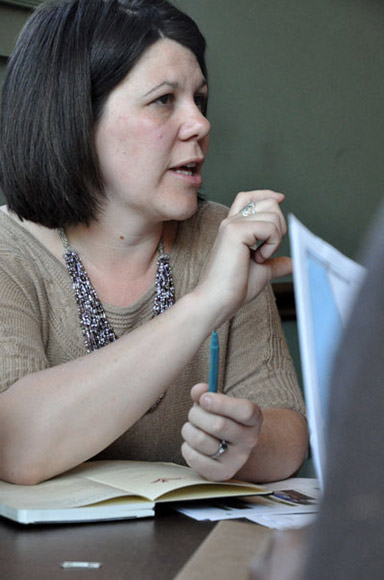When 21-year-old Corey Carrington returned recently to the North Side neighborhood of Marshall-Shadeland where he grew up, he lookd back on his teenage years there.
“There was a lot of us hanging out on the street, on Shadeland Avenue,” he said, “and there weren't always positive things going on. I feel like I want to give back to that street.
“And I realize that I can make a change,” he added.
Carrington gained some experience with community development last year when he helped turn an abandoned baseball field on the South Side Slopes into a community garden as a member of Pittsburgh Public Allies. Now he wanted to know what his own neighborhood needed.
“I realized that while I maybe don't want to be in Pittsburgh all my life, I want to make an effective change in the community that has raised me for so long,” Carrington said.
Now's his chance. He was recently chosen as one of 10 “ambassadors” to be part of ReClaim Northside, a program of GTECH Strategies that trains community members to complete a green project on a vacant lot in their neighborhoods.
The program teaches participants how to gain legal access to vacant properties, gather the right materials to fix them up, seek funding, organize volunteer help and acquire other necessary skills. The instructors include GTECH staff as well as representatives from Pittsburgh's office of city planning, the Urban Redevelopment Authority (which, along with the city, owns a large number of vacant land), the Pittsburgh Community Reinvestment Group and the Pittsburgh Parks Conservancy.
Each ambassador receives a stipend of $1,000 plus $4,000 to spend on implementing his or her idea, as well as a $100 continuing education fund to pay for a class on such applicable skills as tree tending or public speaking.
Carrington had several lots in mind as his potential target. He was considering trying to put in a community garden, an art project or possibly even a public performance green space.
“I don't know how feasible that would be on the North Side, but I'm a dreamer,” he said.
So far, the lessons he has learned on selecting and acquiring one of the city's 27,777 vacant parcels have been “really exciting, because I'm realizing the potential of what can happen and how effective the change can be,” he said. “It's good to see people who are like-minded and who care and have the same vision for their communities.”
GTECH's goal, said Megan Zeigler, ReClaim's senior manager, is to “identify key, emerging leaders, give them the skills and knowledge and have them educate their neighbors” about creating neighborhood improvements.
The hope, added GTECH CEO Andrew Butcher, is to serve a community need and devise an appropriate use for each site. An urban garden or farm is not the right choice for every site; some could be used to mitigate stormwater runoff or initiate community art programs.
GTECH has been working for six years on vacant land in 60 communities locally “to try to harness and even fuel some of the community energy around how to use vacant land,” Butcher said. “We know that green strategies play a really important role in vacant land, and vacant land is often a start for comprehensive community development.”
Uncommon sense
As Corey Carrington also realized, early in the class, the lessons he was about to learn weren't very hard: “A lot of it is common sense, but not common sense that the common person would know.”
That's where instructors Zeigler and Evaine Sing, ReClaim's manager, came in. On a recent Wednesday evening, they led the group gathered for just their second session of the 10-month program.
The typical vacant lot in Pittsburgh is about 25 feet wide by 100 feet long, Sing told the small group. “Step one is: Who owns that parcel?” Is it a private owner who might be hard to reach and owe taxes and utility fees on the property, yet still have a legal claim to the land? Or is the site publicly owned? Has it been abandoned or is someone still caring for it? Or is someone else already planning to develop it?
“What you're really looking for are projects you're excited about, and going to take ownership of,” said Sing. “We want to see what you can do with the small investment and the tools we've given you to make a change in your neighborhood.”
The program attracted some residents who are already working on vacant land projects, such as Dorrie Smith of Observatory Hill. Smith is a member of the Observatory Hill and North Side Leadership Conference boards and owns a rental building in her neighborhood. Anticipating success under the city's sideyard program, which eases the process for people to buy vacant land abutting their own property, she was already fencing, planting and maintaining land she didn't own, she said. “I just treat it as mine, because I know eventually it is going to happen,” she explained.
Smith's goal for her vacant lot project is to “keep us in that country setting that we have” in Observatory Hill, which is surrounded by Riverview Park. “We have huge Victorian homes and a lot of history there, so when a home is taken down, it's hard to rebuild this loss on one lot,” she said. What worked on one street may not work on another. “It's going to be hard to make that connect.”
Quincy Kofi Swatson of Manchester also has experience improving urban lots, having recently helped with a six-lot community garden on North Side's Tripoli Street. He is currently a member of the Coro Center's Next Leader program as well. “My biggest passion is youth development,” Swatson says, “and that green innovation and urban development go hand in hand.” He already has several target lots in mind and hopes to combine gardening and hydroponics for his ReClaim project.
“This is a wonderful program and I wish there were a way more people could access the program and the knowledge they are providing – and the tools they are providing us,” he says.
Ed Brandt was attending ReClaim classes despite being an alternate member of the ambassador program. As an active member of Brightwood Civic Group in Marshall-Shadeland (Brightwood is another name for that neighborhood), he has boarded houses and maintained properties they didn't yet own. “We cut down the hedges because you never want to not be able to see what's going on,” he warned.
Brandt grew up in nearby Emsworth and moved away for graduate school to head the housing authority in Arlington, Virginia, among other posts. But Brandt relocated to Pittsburgh in the early 1990s and has worked on local civic groups since. He just loves to garden; he even trained to be a tree tender. Yet he needed the ReClaim classes as much as anyone, he said, for the “things you may have some knowledge about, but don't have enough knowledge about.”
Sing recommended calling the city's 311 line “persistently” to get maintenance done on vacant or abandoned properties, but admitted, “sometimes you have to do things yourself if you want to get things done.”
Lesson #1
As their first lesson on how to choose a site, the group examined Allegheny County's property assessment website, looking at an overhead photo of a lot near the corner of Suismon and Middle Streets on the North Side, which appeared to be full of green grass and healthy trees. But when Zeigler and Sing visited it two weeks ago to examine it themselves they found brown grass, one scraggly tree and trash strewn along the perimeter, as their photos attested. And when they looked closer at the data on the county website, they found that what looked like one lot was actually five lots together, owned by at least two owners, stretching to another cross street.
So the group learned how to examine their site in person for dumping and littering, green canopy and invasive species, slope and sun access. They learned to grid the site and take soil samples for scientific analysis of nutrients and contaminants. They received lessons on how to talk with nearby stakeholders, the local community development corporation or other community-based organization, and where to find historical maps.
Does the site already have the right utilities, such as water for garden projects? Are there sidewalks that will help, or foundations that will obstruct the project? “Are there eyes on the property to keep it safe?” Sing asked. “Is that really where you want to invest your time and money?”
The group learned that they would have to pitch their project, with GTECH's help, to the city's Open Space Neighborhood Advisory Panel for approval. They also learned that their neighbors probably know a lot about the property – and that their neighbors would likely have a lot to say about the projects devised for these vacant lots.
Smith spoke from experience: “We may want to do something with a particular lot, and all the neighbors come out and say, 'No, no, no, you want to do this.' And we listen.”
And sometimes the neighbors will be people you don't necessarily want for neighbors, group members said.
Lisa Freeman, a graduate of ReClaim Northside last year, sat in to mentor the group this year. Her vacant-lot garden project shares the neighborhood with drug dealers, she said. As she dragged a garbage can full of mulch by them one day, she called to them: “Which one of y'all are going to help me?” She actually got some takers. Then she pulled a second can by. “Whose turn is next?” she said.
“All it took was acknowledging them and not making them feel that they're a drug dealer; no one is supposed to talk to them, everyone is supposed to be afraid of them. It got to the point where, when they knew us, it was [with] the utmost respect. They still sell drugs, but not there.” Now, effectively, she said, “we have a drug prevention activity through that garden. They engage with us. They're one of your stakeholders as well.”
Sing was certainly in favor of involving the neighbors. When the program was over and the ambassadors completed their projects, she recommended using any remaining ReClaim funds to invite people to a ribbon cutting.
“If you get people to care about it and get excited about it, hopefully some of these problems can be set aside,” she said of their projects. “It doesn't have to be: Plant a shrub, hope that change happens.”
MARTY LEVINE is editor of sister publication Pop City's For Good section. Send feedback here.
